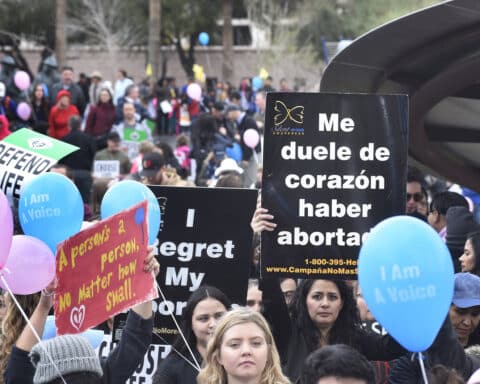As a former public middle school teacher in Massachusetts, Chris Carmody said he would have needed a signed permission slip from a parent or legal guardian to take a student to a Dunkin’ Donuts off campus.
“Yet the same state that says you need the parents’ permission to do anything now says a child can go out and get an abortion, and that the parents don’t have to know about this,” said Carmody, who serves as executive director of Pregnancy Care Center Northeast, a Christian ministry in northern Massachusetts that provides support and counseling for women facing unexpected pregnancies and dealing with post-abortive trauma.
“It’s just so inconsistent with all the other state laws that we have about children and minors,” said Carmody, who told Our Sunday Visitor that a new state law that expands abortion access in Massachusetts will impact his network of three crisis pregnancy centers.
“It’s a big setback, because it’s now going to indoctrinate even younger girls into the belief that abortion is a good thing,” Carmody said.
On Dec. 29, the Massachusetts State Legislature voted to override Gov. Charlie Baker’s veto of the Roe Act, a bill that proponents said would “codify” the legal status of abortion in the event that the U.S. Supreme Court overturned its 1973 ruling in Roe v. Wade that abortion is a constitutionally protected right.
The new law lowers the age of consent — from 18 to 16 — for young women seeking an abortion without notifying a parent or legal guardian. The law also includes new language that makes it easier for women in Massachusetts to obtain an abortion after 24 weeks of pregnancy to “preserve” their physical or mental health.
Baker, a moderate Republican who otherwise supports legal abortion, vetoed the bill on Christmas Eve after state legislators rebuffed his request that they remove the provision to permit minors to terminate a pregnancy without parental permission. Baker also objected to language that expanded late-term abortions.
However, the state legislature kept those provisions and overrode Baker’s veto in less than a week.
“There was such a rush to override the veto and get this through. It’s not the way a bill of this magnitude should have been passed,” said Teresa Larkin, the executive director of A Woman’s Concern, a Massachusetts nonprofit that supports women and families facing unexpected pregnancies.
Larkin told Our Sunday Visitor that she found it “deceptive” how the state legislature crafted the Roe Act as an amendment to an annual fiscal year budget bill, and that lawmakers pushed the law through the legislative process during the holidays in late December.
“It really didn’t allow people the chance to respond in a timely manner and to object,” Larkin said. “It’s very disheartening and very concerning. We’d been working on stopping this kind of bill for so long.”
Larkin said the new abortion law in Massachusetts would primarily affect A Woman’s Concern, which has several locations in and around Boston, by sending a message that abortion is safe and easy, and that there should be no restrictions whatsoever on the procedure.
“That’s the concerning part — that it sort of legitimizes the whole process and removes even more protections for women who may be questioning it and maybe are not sure if this is the right decision for them,” Larkin said.
“At least having abortions available literally at any time throughout pregnancy gives us somewhat of an opportunity to impress upon women there is no need for them to hurry their decision,” Larkin added. “We can let them know that they have plenty of time to make a decision, that they don’t need to make it without taking the steps that involve the services we provide.”
Carmody said the new abortion law will likely mean more women and families seeking out help from the Pregnancy Care Center Northeast, which has locations in Haverhill, Lawrence and Lowell, all north of Boston.
“Our client base will probably grow because more women will have abortions available to them as an option, so that broadens the amount of people that we will need to communicate with to get the message of life out to,” Carmody said.
Before the Roe Act’s passage, Carmody said female clients in Massachusetts often reported that the pressure to abort their children – usually from family and friends – would ease up after the 24th week of pregnancy as abortions that late into term were generally not allowed.
“Whereas now, if there’s that possibility, the pressure from pro-abortion family and friends will continue right up until the birth, which will make it much harder on the women who are trying to make it possible for their child’s life,” Carmody said.
Larkin, of A Woman’s Concern, said her organization’s aim will remain the same — to reach out to women, no matter the circumstances of their pregnancy, and offer them services and an opportunity to consider an option other than abortion
“This law makes our work even more imperative that we reach women before they make that decision, as there is nothing that now stops them from doing this, from seeking an abortion, since any kind of restrictions have literally been removed,” Larkin said. “It’s a very sad day in the Commonwealth.”
Brian Fraga is a contributing editor for Our Sunday Visitor.





